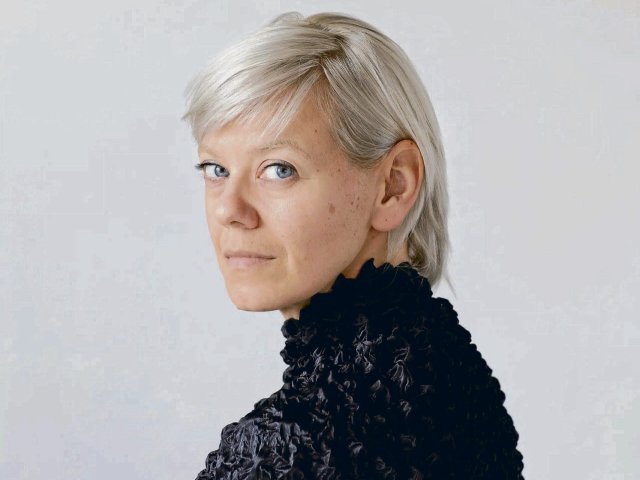Feminism and Literature | "Hand on the Stove"
You three published novels following your studies at the German Literature Institute in Leipzig: Ms. Schätte's "The Black on My Father's Hands," Ms. Unterlehberg's "When We Smile," and Ms. Pauty's "Family Body." Growing up in a misogynistic system plays a role in all three books. Ms. Schätte's book states on the very first page: " When women drink, it's different than when men drink." In Ms. Unterlehberg's novel, the protagonists fight against everyday sexism, while in Ms. Pauty's novel, they fight against transgenerational trauma and medical gaslighting, the phenomenon of not taking symptoms of illness seriously. Does this mean that your books also have a political purpose?
Lena Schätte: I thought about the topic for a very long time. But I didn't really know how to write about it without becoming accusatory or creating perpetrator-victim categories. There's a growing body of alcohol literature, and also more and more female voices talking about their own drinking. However, little literature also looks at the children and spouses, their traumatizing experiences, and what becomes of them later on.
Mascha Unterlehberg: I didn't sit down and want to write a political novel either. But it was clear to me from the start that I wanted to tell the story of a friendship between young women, partly because I haven't read much about it myself: ambivalent, deep friendships in which there are also mutual wounds. I was also interested in the question of how friendship can be empowering in everyday life and what space it can occupy. But because these are women who, like me, grew up in the Ruhr region in the 2000s, political themes automatically flowed in. Female socialization, constant insecurity, objectification.
Michèle Yves Pauty: For me, it started very small. Certain illnesses and experiences occur more frequently, especially among the female members of the family. Especially with my sister, who was increasingly affected by more illnesses, I tried to understand where this came from. During the process, which lasted over three years, I also began to rethink how systematic medical gaslighting is.
What does it do to your protagonist to grow up in a sickly “family body” in a system that denies her illness?
Pauty: We all grow up in systems and are often unaware of everything that goes wrong within them. It's a painful awakening when you realize that there's a system behind it, that there are opportunities to change something, and then you see how little is being done politically. If you look at it historically: Many people have been fighting for a long time to change misogynistic knowledge in schoolbooks, for example, and nothing has happened. Naming and knowing about it can be empowering, but it can also make you angry. It's a difficult process. In my book, the protagonist essentially dissects herself, trying to keep her body healthy and stay away from illness.
In your book, Ms. Unterlehberg, the protagonists try to be there for each other as they grow up. What defines Jara and Anto's relationship?
Unterlehberg: They choose each other and support each other in a world they often perceive as hostile and frightening. They try to block out the outside world, but little by little, they realize that's not possible. The question arises: How well can a relationship withstand misogynistic structures, and at what point do the two fail to support each other?
And there is also something very destructive about the relationship.
Unterlehberg: Absolutely. I think that's not at all atypical for young friendships. You have the feeling that this friendship will last forever and is the most important thing in life. At the same time, you don't yet know who you are or who you want to be, and the potential to hurt each other is very high. Added to that is the internalization of the male gaze, the desire to please, and not having words for things you're ashamed of.
Ambivalence in relationships is also important to you, Ms. Schätte. What solutions have you found to avoid writing classic perpetrator-victim roles?
Schätte: I worked with people affected by addiction as a nurse in the addiction support system and know that they are just as complex and ambivalent as everyone else. Sometimes you're drunk and destructive, and sometimes you're laughing together and just living your daily life. It's all there at once. What was difficult about writing was that it sometimes felt like I was pressing my hand against the stove and seeing how long I could hold out. I tried to ensure that there was always a hint of hope. Writing texts means living in a world with the characters for months. Writing was sometimes like going down to the basement. It was good to then come back up again.
For me, all your books, despite the difficult topics, had neither unbearable heaviness nor pathos.
Schätte: Absolutely. All three topics have the potential for social kitsch, but we've managed that well. We all write in a rather pared-down manner, I think. We describe things rather than overly emotionalizing them. That could also be the influence of our studies at the Literature Institute.
Pauty: This makes us children of our time, even in what we read. These aren't new topics, so I asked myself how to tell stories without repeating them, how to create a new perspective.
What do you mean?
Pauty: I don't know if I could have written the same book 20 years earlier without authors like Carmen Maria Machado, Maggie Nelson, and Esther Kinsky. And even if I had written it, the question is whether I would have found a publisher for it.
Unterlehberg: 20 years ago, political discourses like the #MeToo debate didn't exist in this form. Afterward, it became a little more apparent that, for example, the sexism I write about is structural. With this knowledge, I can now name things more clearly.

Despite the difficult circumstances, your characters in the three novels discover their agency. This strikes me as a difficult balance: portraying the social circumstances without leaving the characters to their fate.
Unterlehberg: For me, it was essential when writing to give the characters agency. They often feel powerless, so I gave them a lot of anger. One can argue about whether it's always justified. But it was also liberating to give it to these two young women.
Schätte: With alcoholism, the narrative is often: someone is addicted, then they experience a turning point, and by the second attempt at the latest, they're clean, driving off into the sunset, looking good, and their blood flow is good. These stories exist, but in my work, I've mostly encountered people who carry addiction as a chronic illness throughout their lives. They have to constantly balance periods of cleanliness and consumption, manage not to lose their job and family, avoid slipping out of the system, and maintain their physical health. I wanted to portray a character who recognizes and fights against transgenerational trauma.

Pauty: I thought a lot about writing itself, about who talks about whom. That's why interviews with my family members appear in the novel. I didn't just want to write about my family, but also give them a voice in the novel. There's no such thing as apolitical writing or silence. After readings, people have come up to me and told me they didn't even know there was a term for medical gaslighting. Sharing knowledge and understanding was important to me in the writing process.
Lena Schätte: The Black on My Father's Hands. Fischer-Verlag, 192 pp., hardcover, €24. Mascha Unterlehberg: When We Smile. Dumont, 256 pp., hardcover, €23.
Michèle Yves Pauty: Family body. Haymon, 224 pages, hardcover, €23.90.
nd-aktuell


